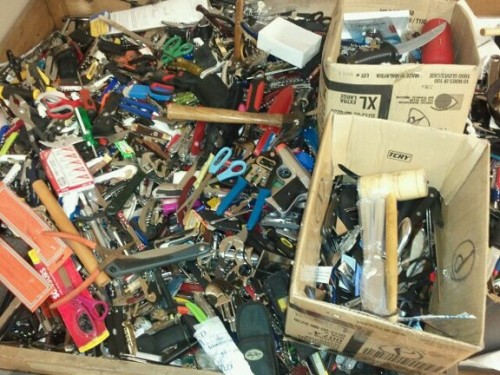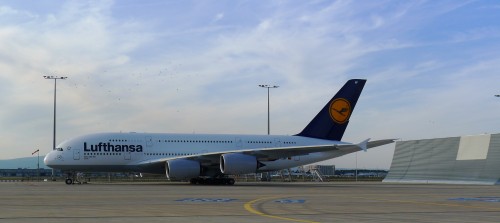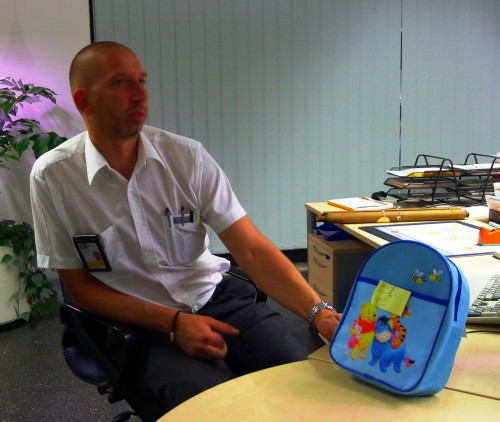As a recent NerdWallet study points out, the amount of luggage lost by airlines spikes during the holiday travel season.
But passengers do their fair share of losing things on airplanes and in airports year-round.
In 2011, for example, the lost-and-found department at Portland International Airport (PDX) logged nearly 16,000 misplaced objects. So far this year, passengers have left behind almost as many items, and the hectic holiday travel season hasn’t even begun.
And it’s not just cell phones, chargers, laptops and eyeglasses that distracted and exhausted travelers leave behind.
“We’ve had dentures, a spare tire, a live fish – in water – and a Crock-Pot with food still inside” turned in, airport spokesperson Kama Simonds told NBC News.
A quick review of the searchable database at San Diego International shows a colander, a piñata, a poster of a U-boat, handcuffs and scented, colored pencils among the items waiting for their owners’ retrieval.
At Denver International, items left behind have included chainsaws, a 60-inch flat screen TV and the back seat of a passenger van, spokesperson Laura Coale said.
“We do everything in our power to locate the person and connect them with their lost item,” Coale said. “If the item has a name or state listed on it, we will conduct a search for them. If cell phones are unlocked, we will call the last number and also look for an ICE [In case of emergency] contact,” she said.
Airports and airlines typically have a set time limit for how long an item will be retained. Southwest Airlines states that it will spend 30 days looking for a passenger’s lost item and once all efforts have been exhausted to find the owner of a found item, the item will be “salvaged” and all proceeds donated to charity.
Denver International stores items for 30 days. Beyond that, clothing is donated to Denver Human Services; everything else becomes surplus and goes to auction.
The Transportation Security Agency also has a 30-day time limit for items left at airport security checkpoints. After that, items are shipped to a state-by-state designated collection facility and “are considered nonreturnable,” said spokesperson David Castelveter. Travelers who have left something behind should “contact the lost-and-found number for the respective airport.” Start by calling TSA (866-289-9673) or looking for a specific lost-and-found contact on its website.
Acting fast is essential, but figuring out where you may have lost something and where to file a claim can be confusing. Items lost on airplanes (and sometimes in gate hold areas) are delivered to the airlines. In some airports, such as PDX, items left at TSA checkpoints and on shuttle buses are brought to a central office; in other airports everything is kept separate. Some large airports have sophisticated, searchable databases; others require that you file a claim with a phone call or e-mail, and keep calling back to see if your item has been found.
Websites such as AirportLostandFound.com – which currently displays details for several lost Kindles, a pair of customized earplugs and more than 200 other lost items – promises to search for matches in the lost-and-found databases of multiple airports and airlines as well as those of food and retail outlets within airports. If they find your item, the site will try to organize a reunion, but there may be a fee.
As the busy holiday travel season approaches, here are a few basics for finding your stuff – and not losing it in the first place.
- Identify cell phones, laptops, books, raincoats and other items with information (phone number, address sticker) that will help someone return a found item.
- Don’t put anything in the seatback pocket of an airplane. It’s just too easy to leave something behind.
- If you lose something, act fast. Retrace your steps, call in or log a claim with the airport and the airline as soon as possible.
- Don’t give up hope. It may take a few days for an item to be found, turned-in and logged into a database.
(My article: Airports & Airlines work hard to return your lost items first appeared on NBC NEW Travel)



